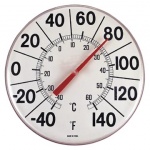Difference between revisions of "Temperature"
m (→Road Proof: formatting) |
m (→Can I use the system outside?: labelled section transclude heat from PS1) |
||
| Line 21: | Line 21: | ||
<section end="conversions" /> | <section end="conversions" /> | ||
</includeonly> | </includeonly> | ||
| + | |||
| + | |||
| + | === Heat and Fan in the {{Classic}} and {{Model I}} === | ||
| + | |||
| + | {{#lst:PS1|heat}} | ||
== Interesting Quotations == | == Interesting Quotations == | ||
Revision as of 01:40, 24 May 2012
Notes about operating and storage temperatures for your L1® System
From the L1® System FAQ
Contents
Storage
The system can be stored in -30°C to 70°C temperatures.
- Fahrenheit conversion: approximately -23°F to 158°F
— Source Can I use the system outside
Can I use the system outside?
Yes. The system has been tested to operate in 32°F to 122°F (0°C to 50°C) temperatures; it can also be stored in -22°F to 158°F (-30°C to 70°C) temperatures. Take precautions in light rain to cover the back panel of the power stand. Keep water out of the air inlet slits inside the back panel, on the loudspeaker drivers or inside the L1 cavity on the power stand.
— Source Can I use the system outside
Heat and Fan in the L1 Classic and L1 Model I
Hilmar-at-Bose speaks about the heat [1]
The PS1 does have fans, but they are only kicking in when you work the system pretty hard. The power amps are very efficient, and a nice side effect of high efficiency, is that there is a lot less heat to get rid off. So unless you are hitting it very hard, the fans will be off and at that kind of volume level, the fans are pretty much inaudible.
Leaving the system inside the bag is perfectly fine. The vents are above the mixer section and if the bag is open enough so you an insert any cables, than its also open enough to get appropriate ventilation.
If possible you should avoid exposing the PS1 (or any kind of electronics for that matter) to direct blazing sunlight. That can generate enormous amounts of heat inside the system to the point where it actually has to shut down (to protect some of the internal components). As a general rule, if it's too hot for you as the performer, than it's probably also too hot for the system. Finding a little shade will certainly help in a scenario like this.
Interesting Quotations
Road Proof
From: Hilmar-at-Bose
All members of our group at Bose are either musicians or sound engineers (outside their day job), so clearly we know what "road-proof" means.
The system went through rigorous design tests, including 5000 insertion and extractions of the cylindrical radiator(tm) loudspeaker (that's a LOT of gigs & rehersals Wink).
Other tests are
- long term full power (in the "bunker")
- high temperature operation (the "oven")
- low temperature operation (the "freezer")
- 3-axis vibration testing (the "shaker")
- high/low temperature storage
- drop tests (including a 220-pound fellow jumping up & down on the power stand)
and many, many more.
And yes, there are drain holes in the bottom of the power stand to deal with the occasional beverage accident.
Hilmar-at-Bose October 23, 2003 referring to the L1 Classic[2]
Extreme Cold: Operating L1® below -10° C
From: MikeZ-at-Bose
Officially we rate our products (and guarantee operation) down to 0 C. We rigorously torture them down at these levels in unimaginable ways to make sure they work perfectly during the cold and after.
But of course you are asking about -10 C. While we haven't officially fully tested down to those levels I am confident you won't have any problems. The speakers will certainly be fine. The powerstand and electronics will heat up quickly to above 0 C internally and be fine.
If you waned to be extra cautious, when you get to the gig just plug in the L1's and turn them on. Let them run with no sound ('idle') for a few minutes. As I was saying, this will bump the internal electronics temperature up to above 0 C.
MikeZ-at-Bose October 17, 2007 [3]
Extreme Cold Suggestions
Hi
In winter, when the outdoor temperature is -39F, the school buses pick up the kids at the road. Unless the wind causes the wind chill factor below -40F then the kids can stay home.
Winter tours are common and most of the gear travels in unheated trailers. The biggest concerns:
- condensation forming on ice cold gear in high humidity environments
- condensation forming on the inside of gear that has ventilation holes in high humidity environments
- cable jackets cracking if uncoiled while still frozen
- plastic parts breaking from impacts while still frozen
- moving lights: attempting to operate gear driven items when the grease may be frozen
In very cold weather I recommend:
- Getting to the gig earlier than usual to allow for gear warm up time.
- Leave the gear inside their bags or cases while it warms up in high humidity environments (extra warm up time will be required since the bags or cases act as an insulator and will slow the warming process).
- Handle the gear with extra care while it is in it's frozen state.
In winter when I have afternoon gigs, I load the car at home in the morning and unload everything at my workplace. I reload the car just before leaving for the gig. This way it doesn't take long for the gear to warm up.
Mark [4]
- ↑ Hilmar-at-Bose speaks about the heat in the Bose® Musicians Community Message Boards
- ↑ Hilmar-at-Bose Can it take a lickin' and keep on tickin'
- ↑ MikeZ-at-Bose Extreme Cold: Operating L1® below -10° C
- ↑ Le5 Ravages of Fire and Ice discussion on the Bose® Pro Portable PA Community
